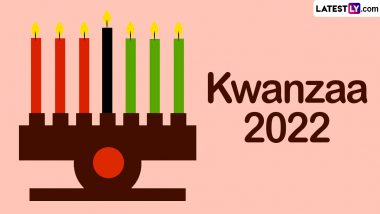Every year, Kwanzaa is celebrated in the month of December with great zeal and gaiety. It is an annual celebration of African-American culture, which begins on December 26 every year and lasts till January 1, culminating in a communal feast called Karamu, usually on the sixth day. The Kwanzaa festival was created by activist Maulana Karenga, based on African harvest festival traditions from various parts of West and Southeast Africa. As we celebrate Kwanzaa 2022, here’s all you need to know about the history and significance of the traditional festival. Winter Holidays Around Christmas Time: From Hanukkah to Kwanzaa, Festivals Other Than Xmas Celebrated During the Holiday Season and Their Significance.
History of Kwanzaa
The Kwanzaa festival was first celebrated in 1966. It was established by American Maulana Karenga and created during the aftermath of the Watts riots as a specifically African-American holiday. According to history, Karenga said his goal was to give blacks an alternative to the existing holiday of Christmas and also give them an opportunity to celebrate themselves and their history; hence, he discovered this day. For Karenga, you must have a cultural revolution before the violent revolution. The cultural revolution gives identity, purpose, and direction. Kwanzaa Meaning and Pronunciation: Know Basic Details About This African-American Festival.
According to Karenga, the name Kwanzaa derives from the Swahili phrase ‘Matunda ya kwanza’, meaning ‘first fruits’. The festival exists in Southern Africa, celebrated in December/January with the southern solstice. Karenga was partly inspired by an account he read of the Zulu festival Umkhosi Wokweshwama. It was then decided to spell the holiday's name with an additional "a" so that it would have a symbolic seven letters.
Significance of Kwanzaa
Kwanzaa festival holds great significance in African-American culture. It celebrates what its founder called the seven principles of Kwanzaa, or Nguzo Saba (originally Nguzu Saba – the seven principles of African Heritage). They were developed in 1965, a year before Kwanzaa was established. These seven principles are all Swahili words, and each of the seven days of Kwanzaa is dedicated to one of the principles.
During the Kwanzaa celebrations, people decorate their houses with objects of art, and colourful African cloth, especially the wearing of kaftans by women. Fresh fruits are used, which represent African idealism. It is a tradition to include children in Kwanzaa ceremonies and to give respect and gratitude to ancestors.
(The above story first appeared on LatestLY on Dec 20, 2022 10:33 PM IST. For more news and updates on politics, world, sports, entertainment and lifestyle, log on to our website latestly.com).













 Quickly
Quickly


